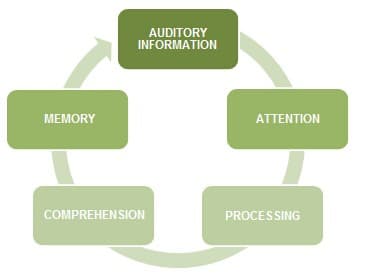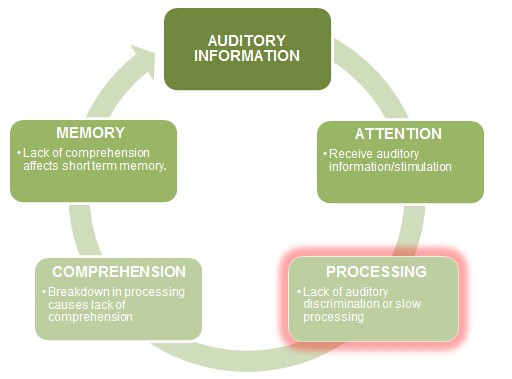Central Auditory Processing Evaluations Martinsville
Auditory Processing Disorders (APD), also known as Central Auditory Processing Disorder (CAPD) is the reduced or impaired ability to discriminate, recognize or comprehend complex sounds, such as those used in words, even though the person’s hearing is normal. For example, understanding boat for coat or the not being able to discriminate the difference in sounds between “sh” and “ch” It is a complex problem that affects about 5% to 7% of school-aged children and it is twice as often diagnosed in boys than in girls.
Although it is difficult to understand, APD is not a problem with hearing per se. The problem lies in the hearing process. In children/adults with APD these electrical signals that come from the sound waves into the ear and are sent to the brain arrive with a delay or distortion, which makes learning and memorizing very difficult.

This Is The Regular Process Of Hearing:
Usually, a person with APD has normal hearing but the brain interprets what it hears as if there were a delay or distortion to the sound. This in turn makes it difficult for the person to comprehend what has been said and therefore he/she is not able to retain the information, thereby affecting their short-term memory. So, although he/she may be hearing everything that is said, he/she may be struggling to process the meaning of it.
Children who “pass” their hearing screening at school or in their pediatrician’s office, do “ok” even when tested by the speech therapist at school, but struggle with long assignments, following directions, appear to not hear (ask for frequent repetitions) or “mishear”, misunderstand humor and idioms, or appear distracted or overly fidgety, may actually be manifesting signs of an auditory processing disorder.

This Is What Happens In A Child/Adult With APD:
A person with APD will often have trouble focusing on schoolwork, multi-task instructions and surprisingly even every day socializing. People tend to retreat in social scenarios so as not to make any mistakes that will permit them to be ridiculed. Their self-esteem can be greatly affected.
APD has been a controversial diagnosis in the medical field. Many people with APD will also have accompanying learning differences that are often diagnosed as the primary problem and therefore APD is overlooked and not properly treated. There are also some medical experts who argue that APD does not exist at all. However, the American Speech-Language-Hearing Association (ASHA) as well as the American Academy of Audiology have presented position statements in which they present the existence of APD among children as well as adults.
What Are The Symptoms?
Signs of APD often appear at a young age, usually in school age children but can be diagnosed in high school children and adults as well. However, it is very important to understand that APD cannot be diagnosed by a checklist. Every person is different and his/her symptoms will manifest themselves differently.
Due to some overlap in symptoms, many children are misdiagnosed with ADD (Attention Deficit Disorder) or ADHD (Attention Deficit Hyperactivity Disorder) as well as other underlying conditions. The truth is that many children will have one of these disorders and delays in addition to APD, but APD can only be diagnosed by a certified audiologist after a series of specifically designed tests.
Symptoms Of APD Can Manifest In Many Different Ways And Can Range From Mild To Severe. Some Symptoms Of APD Include, But Are Not Limited To:
- Difficulty understanding in noisy environments
- Difficulty following multi-task directions
- Difficulty distinguishing between similar sounds
- Language and/or speech delays
- Often requiring repetition or clarification (as if there was a hearing problem present)
- Easily distracted or unusually bothered by loud or sudden noises • improved behavior and performance in quieter settings
- Difficulty understanding abstract information
- Difficulty with verbal math problems
- Disorganized and forgetful
- Have trouble or display poor memory for word and numbers
- Have trouble understanding jokes, riddles or idioms
- Show difficulty in expressive language
- Seems to “tune out” when the conversation is complex or involves too many people
- in school, they will often have difficulties with language, learning, reading and spelling
- If your child has any of these symptoms and you suspect that APD may be the cause, contact a certified audiologist to make an appointment for an evaluation. Keep in mind however, that not all audiologists work with APD testing.
What Causes APD?
There is currently no known definite cause of APD. Research suggests that it can be congenital (some people are born with it) or it can be acquired. Evidence suggests links to recurring middle ear infections, head injury or trauma.
What Is The Proper Treatment?
There are multiple treatments that are recommended and used by professionals for APD but there is not one clear-cut proven solution. Like any other medical treatment, people will respond differently to the treatment chosen for them by his/her parents and team of experts.
What Does an Auditory Processing Evaluation Entail?
A central auditory processing evaluation includes a series of tests that determine how well a person processes, or does, with what he or she hears. Tests of auditory processing are designed to simulate listening tasks encountered in the real world. These tests stress the auditory system by distorting, degrading, filtering or time altering the speech signal.
If I Have A Child With ADP, How Can I Help Her At Home?
- Always talk to your child face to face; try to get him/her to look you in the eyes when talking or when giving out instructions.
- Make instructions simple, no more than three steps at a time. If possible, have him/her repeat the instructions back to you.
- Speak at a slightly lower rate and a slightly louder volume.
- When you are in the car and unable to face your child, turn off the radio when carrying on a conversation. This will eliminate background noise so that your child can fully concentrate on the topic at hand.
- When doing homework, have your child sit in a quiet place (no TV, radio, computer, etc) in order for him/her to concentrate.
- Try placing felt stickers on the bottom of chairs to avoid loud noises when they are moved (tennis balls will also work for the noise but not for the decor!)
BE PATIENT. People with APD have such a hard time on a daily basis trying to sort everything out in their brains and having to deal with other people’s intolerance that what they need most from us is patience, understanding and love.
For more information or to schedule an appointment, contact Speech and Hearing Associates at 1-800-742-7551.